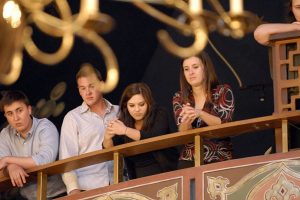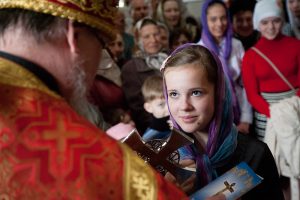For forty days from the middle of August through the end of September and culminating with the celebration of College Student Sunday on October 2, 2016, Orthodox Christians across the country focus on the lives of college students. As students settle on campus for another academic year, it is certain that they will encounter a world full of questions about the very meaning of life and how best to live it. College life will confront them with issues from what it means to be human to how to understand sex and marriage. Today’s college students are tomorrow’s parish council members, Sunday School teachers, and youth group leaders. They are also tomorrow’s parents, and how they understand the Church will shape Orthodox Christianity in America for years to come.
Keeping college students connected to the Church has been the focus of campus ministry for decades. However, the question must be asked: What kind of Church are we keeping college students connected to? Is it an ethnic Church that frequently worships in a language most do not understand? Is it a social Church of meetings, conferences, and festivals? Or is it the Church founded by Jesus Christ –-a church that since Apostolic times has “turned the world upside down”? (Acts 17:5-7)
Orthodox leaders have underestimated college students for well over thirty years, often avoiding the great questions that society asks in an effort to make the Church more “comfortable” and less in conflict with the culture. An example of this is the issue of marriage. Over the past year, there has been a vocal debate about the meaning of marriage on college campuses across the country. Despite the rich moral tradition of the Church, campus ministries have often remained silent or expressed discomfort in addressing such issues. The end result confuses more than it helps students live the Orthodox faith.
Questions and our ability to answer them matter. As Orthodox Christians, we do a great disservice to students when we avoid the questions society is asking. We do an even greater disservice when we do not share with them the answers to these questions that the Orthodox Church provides for fear of being shunned by popular culture. Young people do not want an Orthodox Church that is convenient or “comfortable.” They do not want a Church where serious questions are nuanced away as just “difficult issues.” This is not the courage of the many holy men and women of the Church who changed the world as we know it.
The Orthodox Church has been the greatest agent of human development in history. No institution has done more for humanity than the Church. Young people want to experience this legacy, and this means presenting Orthodox Christianity to them in its fullness. It means challenging students with a robust Orthodoxy that invites them to live the moral heroism and witness of the saints.
With that in mind, here are five ideas every college student should consider as they explore their Orthodox Christian Faith on campus:
1. Leadership begins at Liturgy: Orthodox leaders are not to be found solely in meetings, conventions or committees. They are to be found at liturgy. If you want to be an Orthodox Christian Leader you have to be a liturgical leader who sacrifices his time to consistently live and learn from the liturgical life of the Church. Liturgy is the first and best school of leadership in the Orthodox Church. Keeping connected to the Church means keeping connected to the liturgy of the Church.
2. Morality Matters: One of the great mistakes of modern times has been the idea that there is no such thing as a clear Orthodox Christian morality. This could not be further from the truth. Morality is an essential part of Orthodoxy and what distinguishes Christians from the world. St. Gregory of Nyssa said it best when he wrote: “If we truly think of Christ as our source of holiness, we shall refrain from anything wicked or impure in thought or act and thus show ourselves to be worthy bearers of his name. For the quality of holiness is shown not by what we say but by what we do in life.” Being Orthodox means being moral and embracing what the Church has taught for centuries on such issues as sex, abortion, capital punishment, and marriage. It also means discovering that behind each “NO” the Church gives us, there is a greater and more beautiful “YES”. Keeping connected to the Church means keeping connected to the moral teachings of the Church.
3. Difficult Questions Lead To Great Answers: Every great question we encounter in life is a gift from God to deepen our relationship with Him. The greatness of Orthodox Christianity is seen when the Church responds to the great questions of society with wisdom, common sense, and compassion. Keeping connected to the Church means keeping connected to the teachings of the Church, and we cannot learn from the Church if we cannot question Her. By challenging the Church with loving questions, we discover the depth and beauty of Orthodox Christian doctrine. No question is irrelevant to the Church because every question can help us discover Christ again and again.
4. Orthodox Christianity is Pro-Life: To identify oneself as an Orthodox Christian is to stand with a pro-life Tradition that is over two thousand years old. Human personhood and human rights begin at conception. The earliest Orthodox Christians understood this and distinguished themselves from those around them by protecting the weakest among us –including the unborn, the elderly, and the disabled. Frederica Matthewes-Green says it best when she writes: “ Our Orthodox Christian heritage is absolutely opposed to abortion and child-killing from its very beginnings. This stand against abortion and exposure of infants is, in fact, one of the things that attracted people to the Christian faith.” Keeping connected to the Church means keeping connected to the great human rights struggle of our time that is the pro-life movement.
5. Religious Freedom is Needed More Than Ever: Today, millions of Orthodox Christians are persecuted and martyred for their faith. Religious freedom is a vital issue that must be embraced for the Church to survive. Religious freedom is more than just being able to go to Church on a Sunday. It is the right to live, express, and share our religious beliefs. Religious freedom means being able to seek the truth while respecting the rights of others to do so as well. Being an Orthodox Christian is not a private opinion that gets switched on and off in our lives when convenient. It is not something that is reserved for Sundays but hidden throughout the week in the classroom. Eric Metaxas says it best when he writes: “Faith is either something that informs one at all times or it isn’t anything at all, really. When the…government tells its citizens that they can worship in a certain building on a certain day, but once they leave that building they must bow to the secular orthodoxy of the state, you have a cynical lie at work.” Keeping connected to the Church means being connected to our faith every day and understanding that Orthodoxy has a voice in how we all live our lives.
College campuses today are very much like the world the first disciples experienced. They are worlds of competing ideas and an abundance of choices. This is the world in which the first Christians found themselves, and yet it was a world they changed by embracing Jesus Christ without apology. If Twelve Apostles can alter the course of the Roman Empire, then certainly Orthodox College Students have the ability to change the campus on which they live.
A previous version of this essay first appeared on www.myocn.net




















